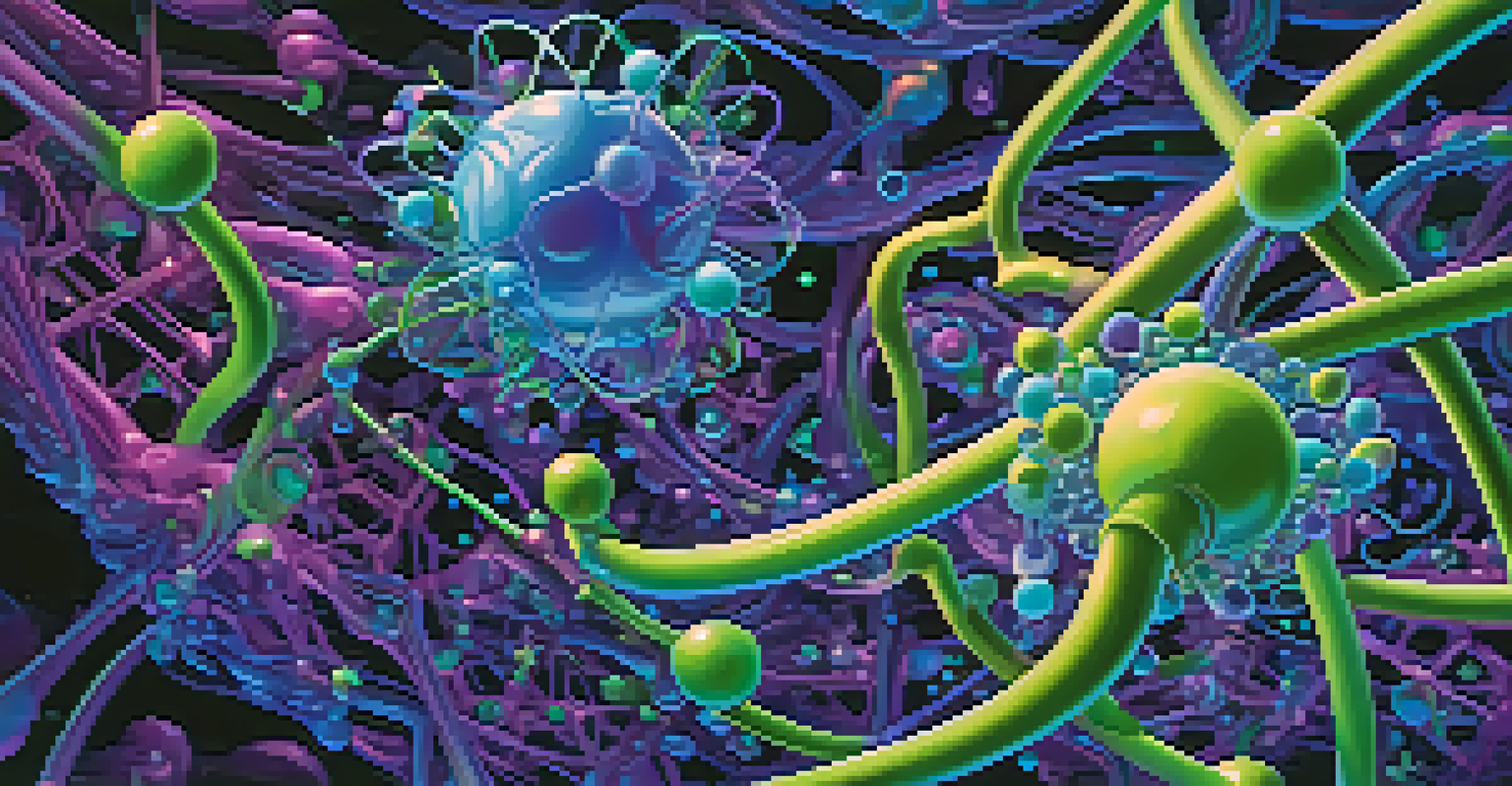Quantum Computing and Healthcare: Innovations on the Horizon

Understanding Quantum Computing Basics for Healthcare
Quantum computing might sound like something out of a sci-fi movie, but it's becoming a reality. At its core, this technology uses the principles of quantum mechanics to process information in ways that classical computers simply can't match. By leveraging qubits, which can represent multiple states simultaneously, quantum computers can tackle complex problems much faster than traditional systems.
The greatest advances in the field of medicine will come from the fusion of technology and biology, as we harness the power of quantum computing to unlock new potential in patient care.
In healthcare, this means the potential for breakthroughs that were previously unimaginable. For instance, the ability to analyze vast amounts of genetic data to identify disease patterns or to develop personalized treatment plans tailored to individual patients. The implications for research and patient care are profound, as we move from a one-size-fits-all approach to more targeted therapies.
As we delve deeper into the innovations that quantum computing could bring to healthcare, it's important to understand these foundational concepts. With a grasp of how quantum computing operates, we can better appreciate its transformative potential in the medical field.
Accelerating Drug Discovery with Quantum Computing
One of the most exciting applications of quantum computing in healthcare is its potential to revolutionize drug discovery. Traditional drug development processes can take years, often with a high rate of failure. Quantum computers, however, can simulate molecular interactions at an unprecedented scale and speed, allowing researchers to predict how different compounds might behave in the body.

This capability could drastically reduce the time and cost associated with bringing new drugs to market. For instance, by using quantum algorithms, scientists can identify promising candidates and optimize their structures before moving on to the costly stages of clinical trials. The efficiency gained here could not only save money but also bring life-saving medications to patients much faster.
Quantum Computing Boosts Drug Discovery
Quantum computing can revolutionize drug development by simulating molecular interactions quickly, reducing the time and cost of bringing new medications to market.
As we look ahead, the collaboration between pharmaceutical companies and quantum computing firms is expected to accelerate. This partnership could lead to significant advancements, making drug discovery not only faster but also more effective, ultimately improving patient outcomes.
Enhancing Personalized Medicine with Quantum Algorithms
Personalized medicine is all about tailoring healthcare treatments to individual characteristics, and quantum computing could take this to the next level. By analyzing complex datasets, including genetic information, lifestyle factors, and environmental influences, quantum algorithms can help identify the most effective treatment plans for patients.
Quantum computing is not just a technological revolution; it offers a new lens through which we can understand and treat diseases, opening up possibilities that were once thought to be science fiction.
Imagine a world where a patient's unique genetic makeup informs their treatment plan, leading to higher success rates and fewer side effects. Quantum computing can process vast datasets in ways that traditional systems cannot, offering insights that were previously out of reach. This could enable healthcare providers to make more informed decisions, optimizing patient care.
The promise of personalized medicine through quantum computing is not just theoretical; it's a growing field of research that holds the promise of transforming how we approach health and wellness. As we gain more understanding of how these technologies can work together, the possibilities become endless.
Revolutionizing Diagnostics with Quantum Technologies
Diagnostics play a critical role in healthcare, and quantum technologies could significantly enhance this area. With their ability to analyze data and recognize patterns, quantum computers could lead to earlier and more accurate disease detection. For example, they could analyze imaging data from MRIs and CT scans, identifying abnormalities that might be missed by the human eye.
Furthermore, quantum sensors could improve the sensitivity of diagnostic tests, allowing for the detection of diseases at much earlier stages. This early detection could be crucial for conditions like cancer, where timely intervention can make all the difference. Imagine a future where diagnostic tools are so precise that they can detect diseases before symptoms even appear.
Personalized Medicine Enhanced by Qubits
By analyzing complex datasets, quantum algorithms can tailor healthcare treatments to individual patients, leading to more effective and targeted therapies.
The integration of quantum technologies into diagnostics represents a paradigm shift in how we approach disease identification. As these innovations continue to evolve, they promise to enhance the quality of care and ultimately save lives.
Quantum Computing's Role in Analyzing Big Data in Healthcare
Healthcare generates a staggering amount of data daily. From patient records to research findings, the sheer volume can be overwhelming. Quantum computing has the potential to analyze this big data more efficiently, uncovering insights that could lead to improved patient care and outcomes.
By harnessing the power of quantum algorithms, healthcare organizations can sift through massive datasets to identify trends, correlations, and anomalies. This can inform everything from public health strategies to individual patient treatment plans. For example, analyzing population data could help identify emerging health threats and guide preventive measures.
As we continue to explore the intersection of quantum computing and big data in healthcare, we can anticipate a future where data-driven decisions lead to more effective healthcare strategies. This will not only enhance patient outcomes but also help healthcare providers operate more efficiently.
Addressing Ethical Challenges in Quantum Healthcare Innovations
With any groundbreaking technology, ethical considerations are paramount. As quantum computing begins to play a role in healthcare, it brings forth questions regarding data privacy, security, and access. Who owns the data generated and analyzed by quantum systems? How can we ensure that these innovations benefit all patients equally?
Moreover, the complexity of quantum algorithms may create a knowledge gap, where only a select few understand the technology's implications. It's crucial that as we advance, we prioritize education and transparency to build trust among patients and healthcare providers. Engaging stakeholders in discussions about ethical practices will be essential.
Quantum Tech Improves Diagnostics
Quantum technologies can enhance diagnostic accuracy, enabling earlier disease detection through advanced data analysis and pattern recognition.
Navigating these ethical challenges is critical to the successful integration of quantum computing into healthcare. By addressing concerns proactively, we can ensure that the innovations not only advance medical science but also uphold the principles of fairness and respect for patient rights.
The Future: Quantum Computing and Healthcare Synergy
As we look to the future, the synergy between quantum computing and healthcare appears promising. The potential for transforming patient care, speeding up research, and enhancing diagnostics is immense. Organizations are beginning to invest in quantum technologies, signaling a shift toward a future where these advanced tools become integral to healthcare.
However, the journey won't be without its challenges. We must ensure that the technology is accessible, affordable, and secure for all. Collaboration between technologists, healthcare providers, and policymakers will be essential in shaping this future. Together, they can address the obstacles and maximize the benefits of quantum innovations.

Ultimately, the integration of quantum computing into healthcare has the potential to redefine how we approach health, leading to breakthroughs that could improve lives around the globe. As we stand on the brink of this new frontier, the possibilities are truly exciting.